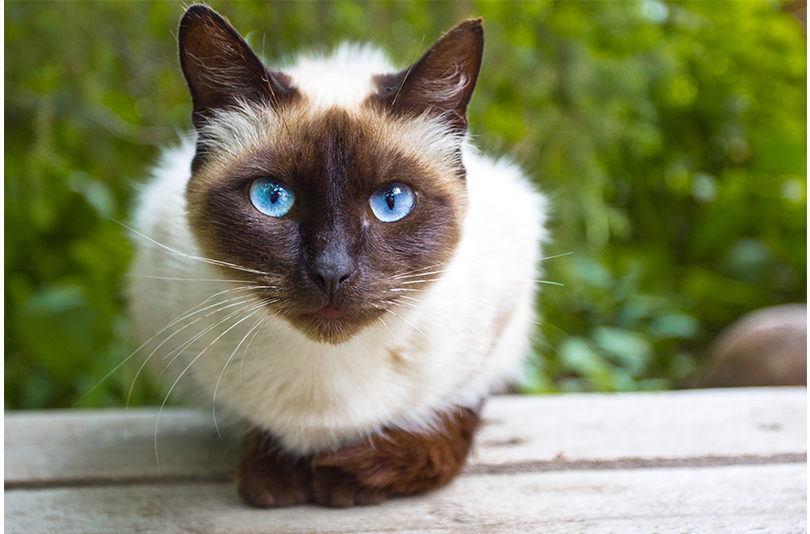Siamese Cat Breed Information
Quick Siamese Cat Facts
-
Weight: 6-10 pounds
-
Life Span: 11-15 years
-
Nature: Social, Loyal, Interactive, Demanding
World-famous for their pointed ears, striking blue eyes, and sleek figures, Siamese cats can be identified by almost anyone. This breed loves to play fetch, cuddle with their companions, and bask in the sun. If you’re thinking of adopting a Siamese cat, here’s what you need to know.
A Little History
While their exact origins are generally unknown, most historians agree that the earliest versions of Siamese cats emerged from the east. There are depictions of felines bearing the likeness of Siamese cats in manuscripts recovered from the ancient capital of Siam (known today as Thailand). With that in mind, it’s likely that this breed’s origins go back as far as 1350. They were adored by royalty, and it was common belief that the Siamese cat received the soul of its deceased royal family members. Nevertheless, it was 1879 when the first Siamese cats debuted at the Crystal Palace Cat Show in London. Other reports suggest that the Siamese cat may have attended an earlier showing in 1871, but the breed was widely unaccepted by judges at that time.
What is the Siamese Cat Like?
In Marge Naples’ 1978 book This is the Siamese Cat, she highlighted several of the breed’s virtues, including its grace, strength, affection, and courage. They rely upon their humans for companionship and are known to chatter about the house when lonely. Because they are quite strong, it’s important to handle them carefully until their trust and affection is earned. They are known to do well with children, engaging in several games such as fetch, and will go out of their way to sit on or near their owners. Depending on the breed registry, the Siamese cat has differing breed standards. Their ears and faces are pointed and usually masked, and their frames are long and slender. They can be seal, chocolate, lilac, or blue point, with a body generally lighter than their “points” (face, feet, ears, tail). Their hair is short and fine, and only sheds moderately.
Caring for a Siamese Cat
Siamese cats are relatively easy to groom. You should brush or comb your Siamese cat once a week, trimming their nails as needed. It’s important to brush their teeth routinely to avoid dental disease. Because this breed is so interactive, they require a significant time commitment from their owners to avoid frustration and loneliness. While they may enjoy a romp outdoors, it’s best to keep this feline indoors to limit their exposure to disease and illness. You should also check their ears routinely, removing debris and consulting with your veterinarian for any unusual conditions.
Most Siamese cats are generally healthy, although they may be more prone to dental and respiratory issues because of their short faces. Ask the breeder about familial health history and consult with your veterinarian about any health concerns. Some of the most common medical conditions that affect cats include vomiting, feline lower urinary tract disease (FLUTD), and eye problems.
The Cost
Breeders charge between $250 to $500 for Siamese kittens, but you should also be prepared to spend around $750 for supplies, food, and initial veterinary expenses in the first year. Each year after that you should expect to spend at least $500 annually on veterinary expenses.
Unfortunately, there’s no way to know when our pets will get sick or injured, and sometimes the bills can be just as unpredictable. With a cat insurance policy from 4Paws Insurance, pet parents can focus more on important veterinary decisions and worry less about the cost.
Sandy Says: Comments from the Chief Pet Officer
The Siamese cat makes a great companion for cat lovers and dog lovers alike. Many cat fanciers compare their tendencies to dogs, as they can be quite vocal, love to stay by their owner’s side, and even enjoy learning to perform tricks. If you are not able to spend a great deal of time with your pets, know that a Siamese cat will grow lonely in your absence. If that is the case, consider getting a pair that will keep each other entertained while you are away.
http://www.cfa.org
http://www.cattime.com
https://pets.webmd.com/cats/6-most-common-cat-health-problems
